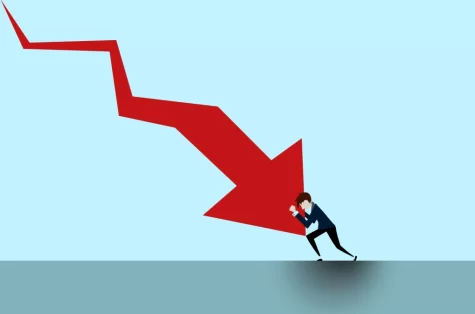Winter Holidays: Sustainability during the holidays
With the holiday season upon us, many feel compelled to go out and buy gifts for all of their friends and family without realizing the ecological impact of their actions.
For generations, people have celebrated winter holidays such as Christmas and Hanukkah by buying gifts for friends and family, with the intent of spreading joy and showing appreciation for their loved ones. According to the University of Bologna, the image of Santa Claus, mall Santas and Christmas cards were all created in the mid-1800s to encourage Americans to spend more during the holidays. This started the transition from Christmas being about feasting, being thankful and celebrating religiously, to being centered around gift-giving.
As the years went on, companies continued the new tradition of attracting families to department stores, hoping to compel them into spending more on gifts for friends and family.
In the 1950s, plastic became more readily available, meaning that gifts became cheaper as they no longer had to be made of natural materials. Of course, the plethora of new toys, dolls and gifts available at a lower price affected the spending habits of holiday shoppers.
Yearly holiday spending has been continually increasing since then. According to the National Retail Federation, holiday retail sales averaged a 4.6% increase per year for the last 10 years. While Christmas is responsible for most of the holiday spending, households that celebrate Hanukkah spend an average of about five times more than the typical household during the holiday season.
With a projected $960.4 billion in holiday spending this year, according to the NRF, it is important to keep in mind the consequences of buying disposable or non-sustainable gifts. In addition, it is crucial to be intentional with gift shopping. With Black Friday and the seemingly endless stream of sales bombarding consumers from every angle, it is important to take the time to think about the reasons people buy gifts instead of how much they save. After all, the entire reason for massive discounts is to make the consumer buy things they do not need by giving them the illusion that they are saving money. By resisting the temptation, consumers can ensure they are spending effectively.
Due to the pandemic, during the years 2020 and 2021, fewer holiday celebrations were held and many learned to appreciate the people in their lives as opposed to meaningless objects. This reminded everyone what the holiday season is truly about: appreciating and spending time with loved ones. Carrying this lesson into 2022 would greatly benefit people who celebrate and the planet. This could mean purchasing more meaningful gifts in smaller quantities or simply focusing on celebrating with loved ones, rather than getting caught up in the gift-buying frenzy.
USA Today says that the average American throws away about $71 of unwanted gifts annually. One way to minimize environmental impact during holiday shopping is to give meaningful gifts that are made sustainably with natural or recyclable materials, or by buying a reusable alternative for a disposable product. For example, one could buy reusable makeup brushes for someone who uses only disposable makeup applicators, thus reducing the number of disposable products that person would have to purchase.
Another potential option when it comes to buying gifts is purchasing from small local businesses. This would ensure that while one is shopping, they are also ensuring that their money is going back into the local economy. In addition, small businesses tend to be more sustainable than large companies, especially when products are handmade and materials are sustainably sourced.
While it is easy to get swept up in the holiday shopping frenzy, keeping the true spirit of the holidays in mind is important. The holidays should be a time to appreciate the people and experiences life has to offer, not focus on receiving gifts – especially as COVID-19 has reminded people over the past two years how important human connection is.
























Lotem ~ Jan 29, 2024 at 12:13 pm
hi molly! i loved this article and i think you brought up some interesting point of views which i have never heard of before! I love your thinking and i think you should be chosen for editor chief next year!